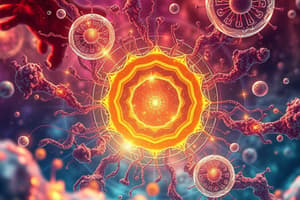Podcast
Questions and Answers
Which of the following describes the role of organelles in cells?
Which of the following describes the role of organelles in cells?
- Organelles are the energy sources in cells
- Organelles are the building blocks of cells
- Organelles are responsible for cell division
- Organelles are the specialized structures within cells that perform specific functions (correct)
In the hierarchy of biological organization, what level comes after cells?
In the hierarchy of biological organization, what level comes after cells?
- Organisms
- Tissues (correct)
- Molecules
- Organs
Which of the following is NOT one of the five main levels of biological organization mentioned in the text?
Which of the following is NOT one of the five main levels of biological organization mentioned in the text?
- Organs
- Molecules
- Organisms
- Systems (correct)
What is the fundamental unit of life according to the text?
What is the fundamental unit of life according to the text?
Which concept is essential for comprehending life's complexity?
Which concept is essential for comprehending life's complexity?
Which kingdom includes protozoa and algae?
Which kingdom includes protozoa and algae?
How do cells, tissues, organs, and organ systems work together in an organism?
How do cells, tissues, organs, and organ systems work together in an organism?
What do biologists gain from classifying organisms into kingdoms?
What do biologists gain from classifying organisms into kingdoms?
What is crucial for appreciating the complexity of life in biology?
What is crucial for appreciating the complexity of life in biology?
Which branch of biology involves studying the interaction between organisms and their environment?
Which branch of biology involves studying the interaction between organisms and their environment?
Flashcards are hidden until you start studying
Study Notes
Exploring Biology: Cellular Organization, Levels of Organization, Five Kingdoms, and Linkages
Biology, the scientific study of life, is a complex and multifaceted field. To understand its intricacies, we'll delve into its foundational concepts, including cellular organization, levels of biological organization, the five kingdoms, and the linkages between these concepts.
Cellular Organization
Life begins at the cellular level, with all living organisms being made of cells. Cells are the fundamental units of life, designed for specific functions in diverse organisms, from microscopic bacteria to enormous trees. Cells contain organelles—subcellular structures with specialized functions. Understanding cellular organization is crucial for comprehending life's complexity.
Levels of Biological Organization
Organisms can be organized into hierarchical levels, each with distinct characteristics that help us understand their functions and interactions. The five main levels of organization are:
- Molecules: Atoms combine to form molecules like DNA, proteins, and carbohydrates.
- Cells: Organelles within cells carry out essential functions, such as photosynthesis, respiration, and reproduction.
- Tissues: Cells group together to form tissues, like skin, muscle, or nerve cells, which have specific functions.
- Organs: Tissues work together in organs, like the liver, heart, or eye, to perform particular tasks.
- Organisms: Organs integrate to form organisms, which can interact with the environment and reproduce.
The Five Kingdoms
Living organisms are traditionally classified into the five kingdoms: Monera (bacteria), Protista (protozoa and algae), Fungi, Plantae (plants), and Animalia (animals). The kingdom classification helps biologists understand the evolutionary relationships and functions of different organisms.
Linkages
Understanding the linkages between the concepts discussed above is crucial for appreciating the complexity of life. For instance, focusing on a single cell may help us understand how organelles function together, while examining an entire organism can reveal how cells, tissues, organs, and organ systems work together to sustain life.
Conclusion
Biology's intricacies are best understood when examining its foundational concepts, such as cellular organization, levels of biological organization, the five kingdoms, and linkages. By exploring these concepts, we can appreciate the complexity of life and the beauty of our natural world.
Studying That Suits You
Use AI to generate personalized quizzes and flashcards to suit your learning preferences.




